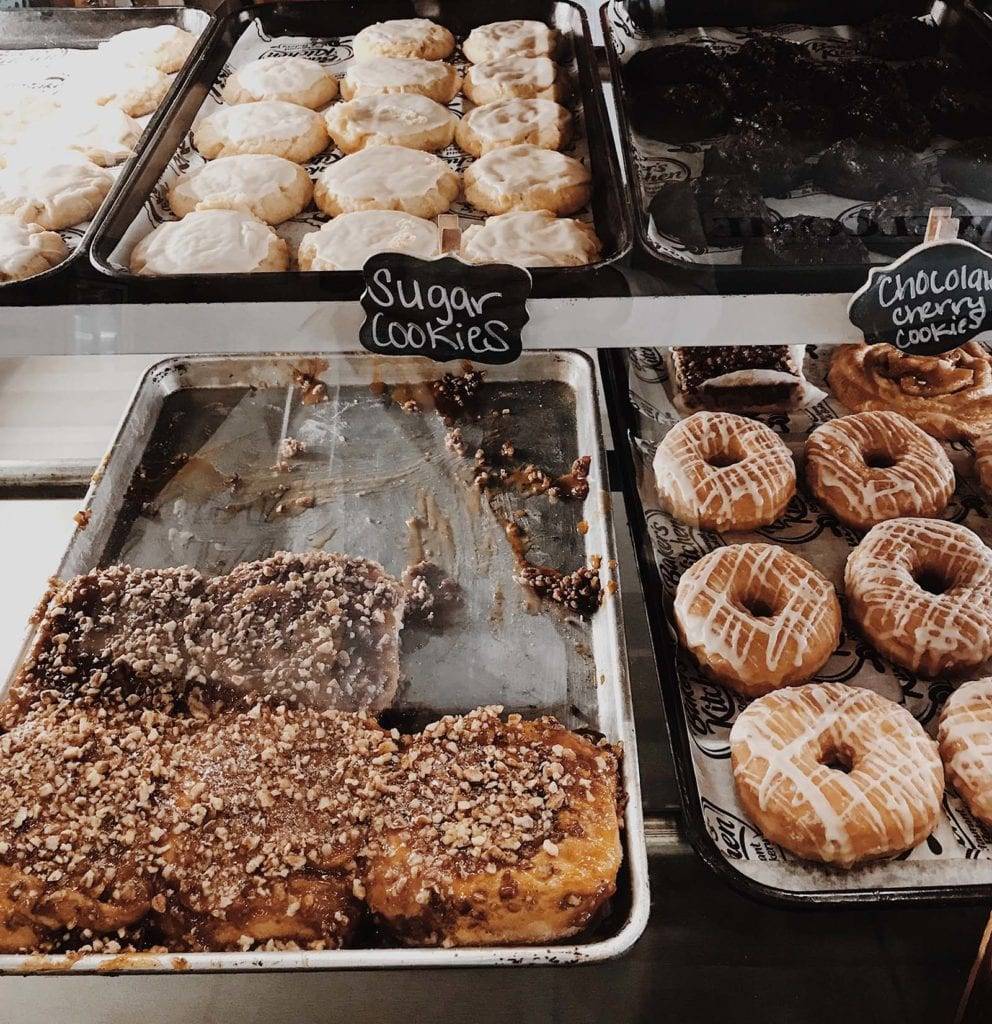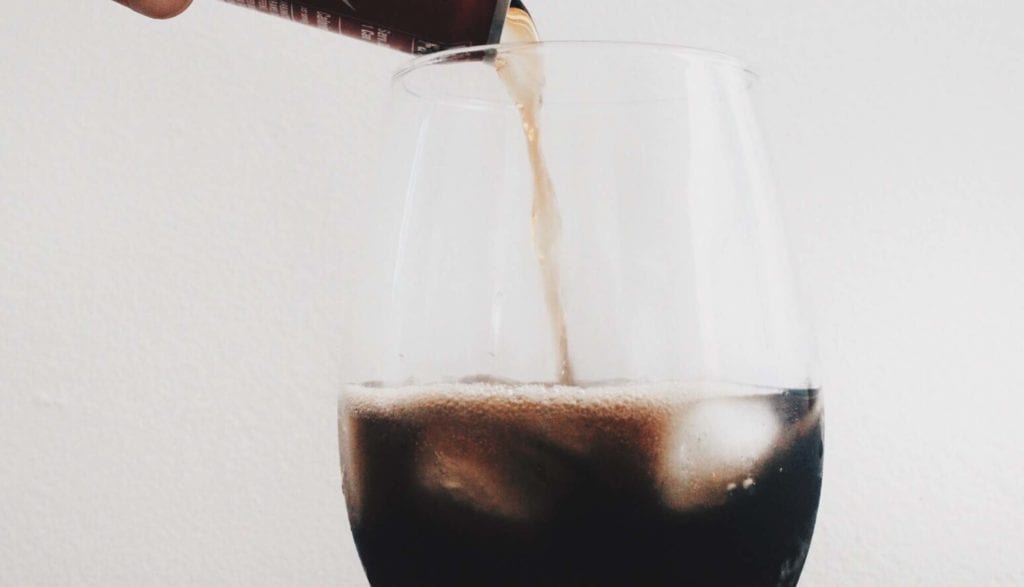Did you know Americans consume roughly 76.7 grams per day? That is equivalent to 306 empty calories a day! There is limited storage in the muscles, liver and brain for all of this added sugar. Unfortunately, the excess sugar must be stored somewhere and ends up being stored in the body as fat.
Unlike sugar storage, fat storage is unlimited! So to work off the empty calories consumed from sugar alone, on average, you would have to hold a plank for two hours, do 30 minutes of constant push-ups or do 358 pull-ups! Is the sugar worth it? I think not—especially because sugar is void of all nutrients, does not satiate your appetite and actually leaves you hungrier!
Consuming too much sugar can also make your brain feel foggy, cause you to gain unwanted body fat and deplete you of energy. It’s time to get educated on the effects sugar has on your health and cut it out of your diet for good!

Sugar Addiction Is Real!
People joke about being addicted to sugar, but it’s actually a real struggle and not a joke. Added sugar provokes the release of dopamine, which is a neurotransmitter that works within the reward center of your brain and plays a crucial role in your feelings of hunger and pleasure.
Consuming high amounts of sugar leads to high amounts of dopamine being released, which then provides you with a feeling of amazing satisfaction. But if you consume sugar on a regular basis, your brain grows accustomed to this constant sugar satisfaction and begins to “need” this sweet taste to continue experiencing this feeling. When you continue to feed your brain its “needed” sugar, it then begins to require more and more to gain that same reward. This is due to your dopamine receptors becoming desensitized from all the sugar, requiring more dopamine to be released and an actual addiction begins.
Sugar, Insulin and Fat Storage
It is important to note that all sugar is not processed in the body the same way. When discussing added sugar, we are talking about processed, refined sugar. When you eat refined sugar, it goes directly into your bloodstream and causes a huge spike in your blood sugar. This causes insulin to then be released. The job of insulin is to remove excess sugar from the blood, store it in the body and keep blood sugar levels in check.
When excess sugar hits the bloodstream, you experience the well-known “sugar high” effect, where you feel extremely energized for a short period of time. This causes an overestimated amount of insulin to be released, removing more sugar than necessary from your bloodstream and causing the classic “sugar crash.”
When you experience the crash, your body thinks it “needs” more sugar, so you eat more sugar, and a vicious circle begins. Some like to call this the sugar roller-coaster. Naturally occurring sugar from fruit, meanwhile, is mixed with fiber and does not affect the body quite the same way. Fiber slows down the digestion process, resulting in the naturally occurring sugar being able to enter the bloodstream slowly and keeping blood sugar levels in balance.
Insulin is also a fat-storing hormone. While it is a necessity for proper functioning of the body, when in excess it becomes harmful. Insulin triggers a fat storage enzyme and, at the same time, represses the enzyme responsible for the breakdown of fat. Therefore, you are shutting down the fat-burning process when consuming refined sugar.
As explained above, excess sugar consumption causes insulin to remove too much sugar from your bloodstream, resulting in low blood sugar. When this happens, a stress signal is sent to the brain and your brain reacts by releasing cortisol, your stress hormone. This is bad news for you because cortisol energizes and increases your appetite, leading you to eat more than what your body actually needs.
Sugar Is Hiding Everywhere!
When it comes to becoming healthier and fitter, sugar is your greatest enemy in disguise. While some people know they are sugar addicts, others might believe they don’t have a sugar tooth. The truth is, sugar loves to sneak its way into our food any way it can. Food you consider healthy, and food that is not even supposed to be sweet, can be packed with this devious additive. So where is all of the added sugar hiding? Everywhere! Here is a list of common foods with shockingly high amounts of sugar:
- – Pasta sauce (Ragu), ½ cup – 12g
- – Yogurt (Yoplait strawberry), single serving – 27g
- – Granola (Nature Valley), ½ cup – 14g
- – Breakfast cereal (Raisin Bran), ¾ cup – 19g
- – Oatmeal (Quaker apple cinnamon), single-serve package – 22g
- – Baked beans (Bush’s), ½ cup – 15g
- – Trail mix (Emerald Breakfast On the Go) – 17g
- – Jam (Smuckers), 1 tbsp. – 13g
- – Maple syrup, ¼ cup – 47g
- – Fat-free salad dressing (Ken’s Steak House) – 13g
- – Vanilla almond milk (Silk), 1 cup – 13g
- – Tomato soup (Campbell’s On the Go) – 20g
- – BBQ sauce, 2 tbsp. – 15g
- – Energy bar (Cliff Bar chocolate chip) – 21g
- – Applesauce (Motts), 1 snack cup – 19g
- – Fruit cup (Dole), 1 snack cup – 18g
- – Jello, ½ cup – 19g
- – Soda, 12oz – 40g
- – Iced tea (sweetened), 16oz – 44g
- – Sports drinks (Gaterade), 1 bottle – 21g
- – Vitamin drinks (Vitamin Water), 1 bottle – 32g
- – Vanilla latte (Starbucks), 16oz – 32g
5 Steps to Kick Your Sugar Habit
Now that you know the effects sugar has on your brain, body and health, are you ready to kick it to the curb for good? If so, follow these five steps!
1. Read food labels. Sugar is hiding everywhere in your diet! Foods you think are healthy, like many yogurts, sauces, dressings, protein bars, oatmeal and coffee drinks, are packed with sugar. Never assume a food is healthy and sugar-free and always double-check the food label.
2. Eat whole foods. Even processed foods that do not contain sugar quickly break down into sugar. Avoid processed foods that will promote fat storage by consuming as many fresh, whole foods as possible. Whole foods will stabilize your blood sugar, decreasing your sugar cravings. Plus, no need to read the labels on whole foods—sugar can’t sneak its way into them!
3. Detox your kitchen. Look at the food labels on the items in your pantry and refrigerator to find where sugar is hiding in your diet. Toss out the items that are packed with sugar to help you successfully drop the sugar!
4. Buy unsweetened. Choose unsweetened options of foods like yogurt, oatmeal, coffee and plant-based milks. You can always sweeten them yourself with natural sweeteners like honey or stevia.
5. Go at least 21 days without sugar. Your brain can actually be addicted to sugar. The more sugar you eat, the more sugar your brain “requires” to feel satisfied. To break your addiction, go at least 21 days without eating sugar, no matter how much you are craving it! The longer you go without sugar, the less your brain “requires” it and the less you will crave it.

Top Tips to Battle Your Sugar Cravings
1. Drink more water. When you experience a craving, chug a glass of water before eating. Thirst is commonly confused for hunger, leading dehydration to be a common cause of your sugar cravings.
2. Combine protein, healthy fats and fibrous foods at each meal. This powerful combination will stabilize your hunger hormones and keep you full and satisfied for hours without causing any sugar cravings!
3. Eat more fat and less carbs at breakfast. A high-fat breakfast will help avoid a blood sugar spike first thing in the morning, which can also prevent a sugar crash later and a roller-coaster of cravings throughout your day.
4. Don’t skip meals! Skipping meals leads to a drastic drop in energy. When your energy levels drop, your blood sugar levels drop as well, causing your brain to think it needs more sugar. Plus, when you are overly hungry, your willpower can weaken and it’s much more difficult to say “no”!
5. Cook food at home. When you prepare your own food, you are able to control all of the ingredients you use, making it much easier to drop the sugar.
6. Cut out the alcohol. Alcohol lowers your blood sugar, leading your brain to believe you need sugar to maintain normal levels. It also negatively changes the way sugar and carbs are metabolized in the body. Plus, most alcoholic beverages are jam-packed with sugar.
7. Reduce stress. Stress triggers hormones that increase your appetite, leading to dangerous cravings. It’s easier said than done, but decreasing your stress levels will simultaneously decrease your sugar cravings.
8. Get enough sleep. Lack of sleep causes a domino effect of chemical reactions in your body, altering your hormone levels and increasing your sugar cravings! And when you are sleep-deprived, you are much more likely to lack the willpower to say “no” to those cravings.
9. Eat fruit! There is a difference between processed sugar and naturally occuring sugar. Your body processes sugar from fruit more slowly due to its fiber content, so it doesn’t cause the same spike in blood sugar as processed sugar. When a sugar craving hits, grab a piece of fruit and enjoy the sweetness of natural sugar.
10. Ditch the fancy coffee. A Starbucks vanilla latte has 32 grams of sugar! Buy and brew your own vanilla-, caramel-, hazelnut- or mocha-flavored ground coffee beans. Mix together coffee, ½ cup of unsweetened plant-based milk and stevia to taste for your own homemade delicious version!
11. Avoid soda. It is a sugar trap!
12. Drink fruit-flavored herbal tea. Sugar craving setting in? Brew a cup of tea and sweeten it with stevia for a guilt-free sweet taste. Use two tea bags for a stronger flavor. Drinking tea also helps to keep you hydrated and not confuse your thirst for hunger.
13. Add a teaspoon of cinnamon. Try sprinkling cinnamon on coffee, oatmeal, sweet potatoes, apples and protein shakes. It has been shown to help control blood sugar levels.
14. Fight sugar with fat. Add more fat into your diet to overcome your sugar cravings. Healthy fats fuel the body, stabilize your blood sugar levels, cut hunger and keep you full and satisfied for hours.
15. Work out! Being active for at least 30 minutes every day reduces your sugar cravings.



